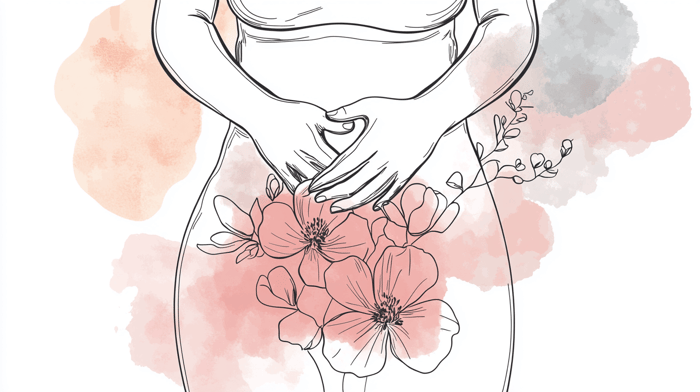A woman’s vaginal pH balance plays a vital role in her reproductive health. The ideal vaginal pH level ranges between 3.5 to 4.5, indicating the presence of good bacteria that protect against infections. An unbalanced vaginal pH can lead to discomfort, itching, and bad odor, which may result in more severe infections if untreated. In this article, we’ll explore how to balance vaginal pH naturally and introduce some of the best vaginal pH products available from Get Flower Power.
Understanding Vaginal pH
Before diving into how to balance vaginal pH naturally, it's essential to understand what vaginal pH is. Vaginal pH refers to the acidity or alkalinity of the vagina, which can fluctuate throughout the menstrual cycle. A healthy vaginal pH should range from 3.5 to 4.5.
A balanced pH level is crucial for maintaining a healthy vaginal environment. If the pH becomes unbalanced, harmful bacteria may thrive, leading to infections like bacterial vaginosis or yeast infections. Factors that affect vaginal pH include menstrual cycles, sexual activity, douching, certain medications, and hygiene practices.
Signs of a Vaginal pH Imbalance
Vaginal pH imbalance often results from an overgrowth of harmful bacteria or a reduction in beneficial bacteria. Signs include:
- Abnormal discharge: Increased discharge that may be thick, white, or gray with a strong odor.
- Itching and irritation: Vaginal itching, burning, or irritation.
- Pain during sex: Discomfort or pain during intercourse.
- Urinary tract infections (UTIs): Increased risk of UTIs due to pH imbalance.
- Changes in discharge color/texture: Thin, watery, or discolored vaginal discharge.
- Bacterial vaginosis: A common infection resulting in a fishy odor and discharge.
If you're experiencing these symptoms, it’s best to consult a healthcare provider for a diagnosis and treatment plan.
Factors That Disrupt Vaginal pH Balance
Several factors can upset vaginal pH balance:
- Antibiotics: They can disrupt the natural balance of bacteria in the vagina, causing harmful bacteria overgrowth.
- Douching: Douching washes away healthy bacteria that help maintain pH balance.
- Menstruation: Menstrual blood can make the vaginal environment more alkaline, encouraging harmful bacteria.
- Sexual activity: Semen, with a pH of 7.1-8, can alter the vaginal pH balance.
- Hormonal changes: Hormonal shifts during pregnancy, menopause, or menstruation can impact vaginal pH.
Start by Testing Your Vaginal pH
Testing your vaginal pH is a simple way to check if it's within a healthy range. The Vaginal pH Testing Kit from Flower Power makes it easy to monitor your pH at home. Each kit includes three individually wrapped pH test strips. To use, insert the pH strip into your vagina for a few seconds, then compare the color of the strip to the color chart on the packaging to determine your pH level.
If your pH is outside the healthy range, take steps to rebalance it by using pH-balancing products or consulting a healthcare provider.
How to Balance Your Vaginal pH Naturally
There are several natural ways to restore your vaginal pH balance without using harsh chemicals or medications:
- Probiotics: Foods rich in probiotics, like yogurt, kefir, and sauerkraut, promote healthy bacteria in the vagina.
- Apple Cider Vinegar: Its antibacterial properties help restore vaginal pH. Mix one part apple cider vinegar with two parts water for a vaginal rinse.
- Baking Soda: Its alkaline properties can neutralize acidity. Mix one tablespoon of baking soda with water for a vaginal rinse.
- Tea Tree Oil: Known for its antifungal and antibacterial properties, tea tree oil diluted with a carrier oil can treat infections and balance pH.
While these remedies may be effective, they aren’t a substitute for medical advice. Consult a healthcare provider if your symptoms are severe or persistent.
Lifestyle Changes for a Healthy Vaginal pH
In addition to natural remedies, lifestyle changes can also help maintain a healthy vaginal pH:
- Practice good hygiene: Wash your genital area with warm water and gentle, unscented soap. Avoid douching or using harsh soaps.
- Wear breathable clothing: Cotton underwear helps prevent bacteria growth. Avoid tight clothing and synthetic fabrics.
- Avoid scented products: Scented soaps, lotions, and feminine hygiene products can upset the pH balance. Use natural alternatives.
- Stay hydrated: Drinking water helps flush out toxins and keeps your body, including your vagina, hydrated.
- Avoid harsh soaps: Use mild, unscented soap to avoid disrupting vaginal pH.
Foods to Eat for a Healthy Vaginal pH
Here are some foods that can support vaginal health:
Whole Grains
Whole grains like brown rice and quinoa are high in fiber, promoting regular bowel movements and reducing vaginal discomfort.
Lean Protein
Chicken, fish, and tofu provide important nutrients like iron and zinc, which support overall and vaginal health.
Garlic
Garlic has antimicrobial properties that support a healthy balance of vaginal flora.
Fresh Fruits and Vegetables
Rich in vitamins and antioxidants, fresh produce can reduce inflammation and help maintain a healthy pH balance.
Yogurt
Yogurt is an excellent source of probiotics, increasing good bacteria in the vagina and restoring acidic pH levels.
Foods to Avoid
Here are foods to limit or avoid for a healthy vaginal pH:
Sugar
Excessive sugar can promote yeast overgrowth and disrupt the balance of bacteria.
Processed Foods
Processed foods are often high in sugar, salt, and unhealthy fats, which can disrupt vaginal flora.
Alcohol and Caffeine
Alcohol and caffeine dehydrate the body, causing vaginal dryness and irritation.
High-Fat Dairy
High-fat dairy can increase inflammation and disrupt vaginal flora. Opt for low-fat or non-dairy alternatives.
Red Meat
Red meat is high in saturated fat, which may increase inflammation. Choose lean protein sources instead.
Spicy Foods
Spicy foods can cause vaginal irritation. Enjoy them in moderation to avoid discomfort.
Conclusion
Maintaining a balanced vaginal pH is key to reproductive health. By incorporating natural remedies, lifestyle changes, and using Flower Power’s pH products, you can help restore balance and promote a healthy vaginal environment.
Explore Flower Power’s range of natural vaginal pH products to feel fresh and confident every day.












